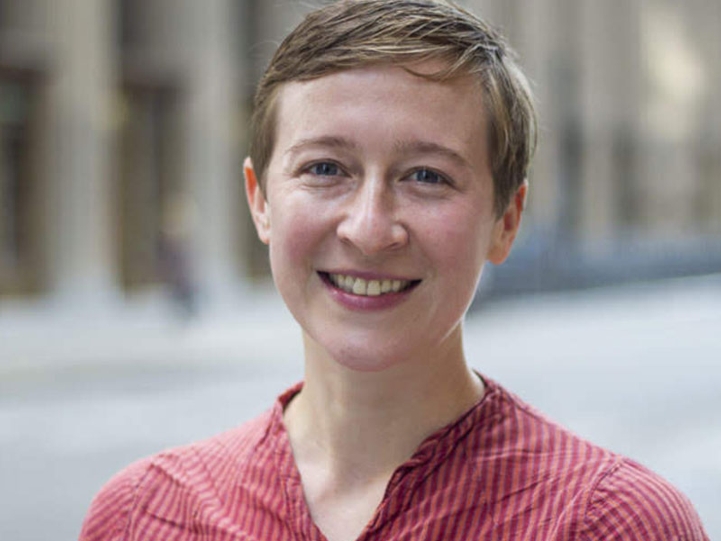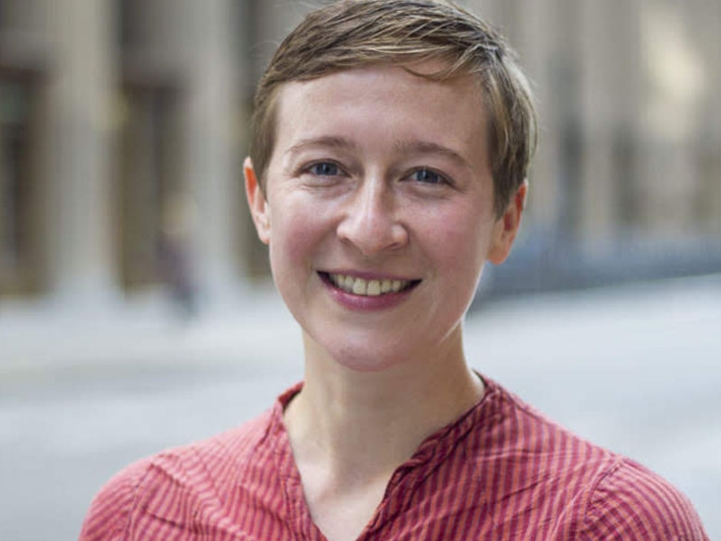
“Tell It Again, Though": Telling Old Stories With New Hope
February 13, 2021
JCC Connexions, Vol. 7, No. 1. February 2021
Engaging Civic Religious Pluralism: An Ongoing Column in JCC Connexions
My partner, two kids (ages 3 and 5) and I packed our Prius as 2020 came to a close and drove from Chicago to San Diego for the month of January. A work opportunity for my partner was also an opportunity for our whole family to feel the sunshine on our bodies and play outside. It is a true blessing and a privilege.
We listened to a lot of music on our 32-hour road trip. Every morning and afternoon my daughter’s request was the same – Hadestown. Hadestown is a folk opera by Anais Mitchell, written in 2006 and produced on Broadway in 2019. I had the good fortune of seeing it performed live in February 2020 in New York City a few weeks before the pandemic halted unnecessary travel across town much less across the country. We listened to the music a lot throughout the pandemic, but I was still surprised that my daughter had become obsessed with this Greek story of Orpheus and Euridice, adapted in a Great Depression-era-inspired, post-apocalyptic setting.
 To cut right to the chase, Orpheus goes into the underworld to bring his beloved, Euridice, back to the land of the living. Hades, the king of the underworld, with the prompting of his wife, Persephone, allow their departure with one caveat. Orpheus cannot look back before he and Euridice are both in the land of the living, or Euridice will return to the underworld forever. Even with the sober hope of something good, something better, doubt creeps in for our young Orpheus, whose senses give him no reassurance of Euridice’s faithful following. He looks back. There are many variations and much debate, but the devastating truth remains: Euridice does not reemerge into life with him. In Hadestown, the god Hermes is the narrator, played by the incredible Andre De Shields (New York Theater, 2019). He sings the haunting lyrics of "Road to Hell II” and somehow convinces the audience that it is indeed worth telling the story again, even if we’ve heard it before, even if we think we know how it ends.
To cut right to the chase, Orpheus goes into the underworld to bring his beloved, Euridice, back to the land of the living. Hades, the king of the underworld, with the prompting of his wife, Persephone, allow their departure with one caveat. Orpheus cannot look back before he and Euridice are both in the land of the living, or Euridice will return to the underworld forever. Even with the sober hope of something good, something better, doubt creeps in for our young Orpheus, whose senses give him no reassurance of Euridice’s faithful following. He looks back. There are many variations and much debate, but the devastating truth remains: Euridice does not reemerge into life with him. In Hadestown, the god Hermes is the narrator, played by the incredible Andre De Shields (New York Theater, 2019). He sings the haunting lyrics of "Road to Hell II” and somehow convinces the audience that it is indeed worth telling the story again, even if we’ve heard it before, even if we think we know how it ends.
A Balanced Environment?
After the January 6th attack on the Capitol, amidst debates about how this is not who we are and this is exactly who we are, many public intellectuals and educators have called for a new way to teach to the moment. Facing History and Ourselves produced a great educational resource the night of the insurrectionist attack and Berkeley’s Greater Good Science Center published insightful responses from educators (Facing History and Ourselves, 2021; Schonfeld, McAvoy, Stitzlein, & Patterson, 2021). My hope in persistence in this national moment of crisis echoes Hermes’s call, and is anchored in important findings from researchers at The Ohio State University and North Carolina State University.
The Interfaith Diversity Experiences and Attitudes Longitudinal Survey (IDEALS), which concluded in 2019, was designed to help researchers understand on a national scale undergraduate encounters with religious and worldview diversity. The promising practices that emerged after following thousands of students at more than 100 institutions throughout their college years offer pathways for fostering campus environments where students of all worldviews can thrive. These findings relate most directly not to the insurrectionists themselves, but to the nation’s students, school age and beyond, who seek to engage across deep difference.
Appreciative attitudes toward people with diverse identities are part of what IFYC calls the interfaith triangle; this triangle reflects the mutually reinforcing relationship between appreciative attitudes, positive knowledge about different worldviews, and relationships across difference. In IDEALS, appreciative attitudes are “considered positive dispositions that reflect respect, admiration, and high regard toward different identity groups,” and the survey measures appreciative attitudes toward 13 social identity groups, including “people of other worldviews, political ideologies, sexualities, gender identities, races, and countries” (Rockenbach, Mayhew, Correia-Harker, Morin, & Dahl, 2018). Findings show that appreciative attitudes grew in balanced environments in which students experienced both space for support and spiritual expression and provocative encounters.
Students who expressed having “high space for support and spiritual expression” affirmed the following:
- My classes are safe places for me to express my worldview
- ;There is a place on this campus where I can express my personal worldview
- This campus is a safe place for me to express my worldview
- Faculty and staff on my campus accommodate my needs with regard to celebrating religious holidays and other important religious observances
What constitutes a provocative encounter, according to IDEALS, is based on student responses to the following statements:
- Had a discussion with someone of another worldview that had a positive influence on their perceptions of that worldview
- Felt challenged to rethink their assumptions about another worldview after someone explained their worldview
- Had class discussions that challenged them to rethink their assumptions about another worldview
- Had a discussion with someone that made them feel like they did not know enough about their own worldview
According to IDEALS, supportive environments are critical in fostering students’ appreciative attitudes, but alone are insufficient for meaningful growth. However, campuses that provided students with a supportive environment while also engaging them in provocative encounters saw growth in appreciative attitudes (Rockenbach, Mayhew, Correia-Harker, Morin, & Dahl, 2018).
College, even in a remote or hybrid structure, is a powerful place for provocative encounters to flourish. Campus learning experiences like dialogues and public speakers paired with reflexive writing are integrated into the curriculum to explicitly foster provocative encounters. These experiences exist alongside resources that foster support like religious and spiritual life staff, peer counselors, counseling centers, advisors, and policies articulating accommodations for one’s religious and spiritual practices.
Interfaith leaders should design provocative encounters not only with complementary support structures in mind, but also attention to not unduly burdening historically marginalized or minority communities. IFYC’s “We Are Each Other’s” curriculum hosted on LRNG shares prompts, for instance, about the kind of reading and reflection that can happen first to better prepare one to connect and then act on new learning (IFYC, 2020).
Classrooms and cities and households across the nation are making sense of the Capital attack even as we seek to construct lives, companies, and communities that offer freedom and thriving to all people. With the clarity of history’s lessons, and the steadfast commitment of educators and activists alike, we should take heart in findings from IDEALS that it is balanced environments – of both challenge and support – that can foster the kind of growth needed for building sustainable relationships across deep difference. As we start a new American chapter, amidst an old song, a story we’ve told again and again, Higher Education is built with the hope that the story may turn out this time.
References
Facing History and Ourselves. (2021, January 6). Responding to the Insurrection at the US Capitol. Retrieved from https://www.facinghistory.org/educator-resources/current-events/responding-insurrection-us-capitol
IFYC.(2020). We are each other's: Getting started. https://www.lrng.org/interfaith-youth-core/playlist/we-are-each-others-getting-started
New York Theater. (2019, April 27). André De Shields in Way Down Hadestown. https://www.youtube.com/watch?v=JV18v90Mgig
Rockenbach, A. N., Mayhew, M. J., Correia-Harker, B. P., Morin, S., & Dahl, L. (2018). IDEALS: Best practices for interfaith learning and development in the first year of college. Interfaith Diversity Experiences & Attitudes Longitudinal Survey. https://www.ifyc.org/sites/default/files/resources/IDEALS_20182.pdf
Schonfeld, D., McAvoy, P., Stitzlein, S., & Patterson, T. (2021, January 15). How to talk with young people about the capitol attacks. https://greatergood.berkeley.edu/article/item/how_to_talk_to_young_people_about_the_capitol_attacks